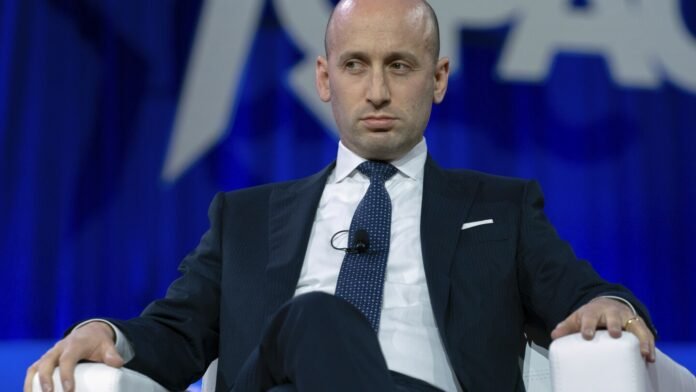The ominous letters went to hundreds of state and local officials across the U.S. two days before Christmas. It was a potential blueprint for how the Trump administration may attack “sanctuary” jurisdictions that resist mass deportations.
They threatened criminal prosecutions and lawsuits going after officials’ personal finances. They invoked RICO, the federal statute often used to fight organized crime.
“You and your subordinates could potentially face up to 20 years in prison,” America First Legal, a group led by current and former advisors to President-elect Donald Trump, said in the letter. Its president, Stephen Miller, will be deputy chief of policy in the new administration and is a longtime architect of Trump’s immigration policies.
The letters’ targets: city, county and state officials in America’s sanctuary jurisdictions, a term rooted in medieval laws that today encompasses a range of protection for immigrants, particularly those living in the U.S. illegally. Sanctuary jurisdictions limit cooperation with federal immigration authorities.
Some targets were chosen for statements they made after Trump’s election. Maura Healey, the Democratic governor of Massachusetts, is taken to task for vowing to use “every tool in the toolbox” to resist mass deportations in her state. But most made the list for refusing to assist U.S. Immigration and Customs and Enforcement by holding people who are wanted for being in the country illegally.
The warnings may signal part of a legal a roadmap for Trump’s crackdown on immigration and pledge of mass deportations. It accuses officials of violating several federal statutes, including one against immigrant smuggling and another against interfering with the work of federal officers.
On Saturday, an official said a federal immigration operation concentrated in Chicago will begin after Trump takes office Monday, targeting more than 300 people with histories of violent crimes. Chicago has been a sanctuary city for decades, and officials there have said they retreat on those commitments.
Courts have repeatedly upheld the legality of most sanctuary laws.
“Sanctuary laws don’t shield or harbor or conceal quote-unquote ‘illegal aliens,’” said Mark Fleming, a lawyer with the Chicago-based National Immigration Justice Center, a pro-immigration group. “What the laws do is they say ’Your role (as federal officials) is to do immigration enforcement. Our role is not, and we’re not going to participate.’”
Immigration lawyers scoffed at the letters’ legal arguments. Police and officials in sanctuary jurisdictions are, they note, enforcing legally enacted laws.
But officials, lawyers and immigration advocates are taking the letters seriously. The involvement of Miller, a senior advisor in Trump’s first term and a major figure in many policy decisions, particularly on immigration, means they have no choice.
Plus, many say, the legal arguments may not even be relevant.
“Letters like these are really more about sowing fear than they are about articulating anything that would hold up from a legal standpoint,” said Sirine Shebaya, an attorney and executive director of the National Immigration Project.
It’s a fear that can be used against officials and against immigrants themselves.
“We are hearing a lot of concern from our immigrant community members about whether the city will continue (as a sanctuary) or will they end it,” said Peter Pedemonti, co-director of the New Sanctuary Movement of Philadelphia.
During the first Trump administration, the White House tried to use financial cudgels against sanctuary jurisdictions by denying them public safety grants that can be key for law enforcement budgets. Courts largely rejected those attempts, though some Trump loyalists say that could happen again in the incoming administration.
The letters may signal that the cudgels will be legal. They went to well over 200 officials, including Los Angeles Mayor Karen Bass, New York Gov. Kathy Hochul and county officials from Maine, Nebraska and California.
They are largely identical, though occasionally personalized with details of crimes allegedly committed by immigrants in a particular official’s jurisdiction.
All are full of dire warnings.
“You each could face criminal prosecution and civil liability for your illegal acts,” wrote James Rogers, senior counsel for America First Legal Foundation.
“Employees in your jurisdiction involved in implementing sanctuary policies that prevent federal immigration officers from carrying out their duties would potentially face six years in prison,” he wrote.
If most lawyers roll their eyes at such threats, they also know that weak legal arguments don’t necessarily stop prosecutions.
“I think these threats are actually a critical cog in the strategy,” said Fleming. “Because the reality is that even if they lose, they can win by putting someone through this.”
Fear of relentless court cases, particularly in smaller jurisdictions without teams of lawyers, could push officials to ease back on sanctuary laws, or even allow local law enforcement to work with federal immigration officers.
ICE, which has just 21,000 employees, many of them administrators or support personnel, would need immense local law enforcement help to follow through on Trump’s promises of mass deportations
The sanctuary designations have already caused deep divisions in some jurisdictions, with sheriffs in California, Washington and elsewhere vowing to ignore sanctuary policies. In Florida, Gov. Ron DeSantis has said he’s prepared to suspend elected officials if they are “neglecting their duties” under Trump’s promised immigration mandates.
But Democratic leaders including Illinois Gov. J.B. Pritzker and New York’s Hochul vowed after Trump’s election that they would stand firm on their sanctuary policies.
A few days after the election, Chicago Mayor Brandon Johnson insisted that the city’s police force would not help ICE agents with deportations.
“We will not bend or break,” Johnson told reporters.
The question is whether sanctuary officials will continue to stand firm in the face of personal legal threats and an incoming White House that has made clear immigration is a top focus.
“Stephen Miller is going to be the deputy chief adviser to the president,” said R. Linus Chan, an attorney who works with immigrants detained by ICE, and a professor at the University of Minnesota Law School. “So you can’t really just ignore him.”
Read More: Trump-allied group’s warnings may signal legal blueprint to attack ‘sanctuary’ jurisdictions


